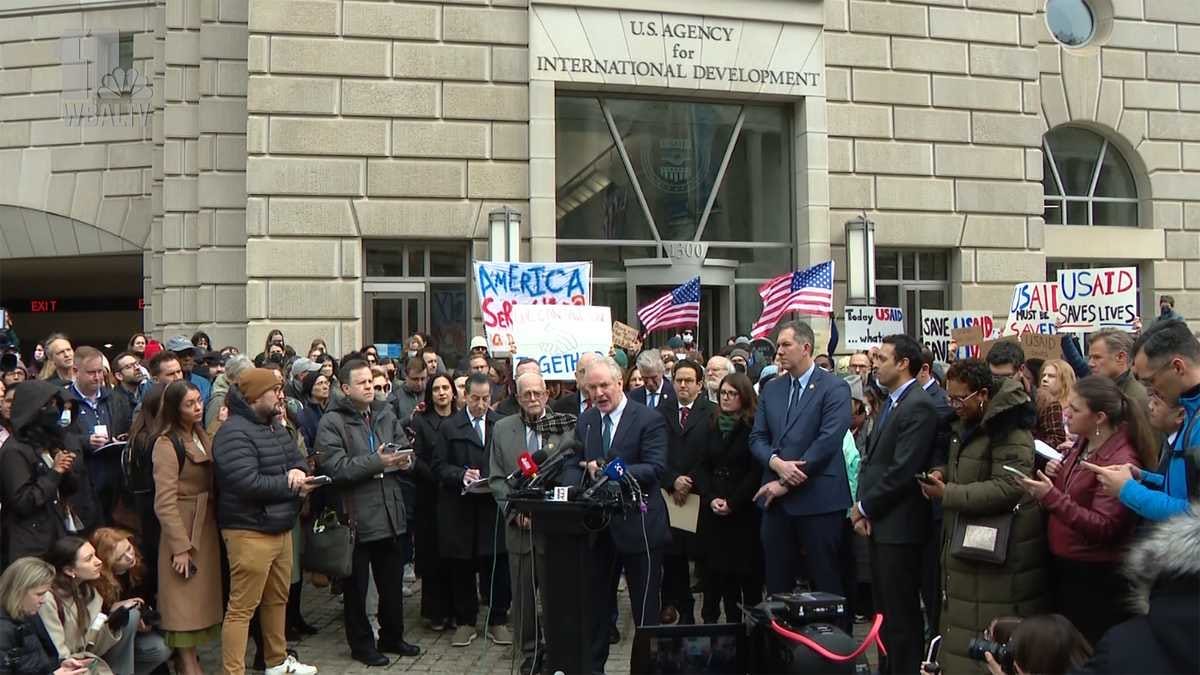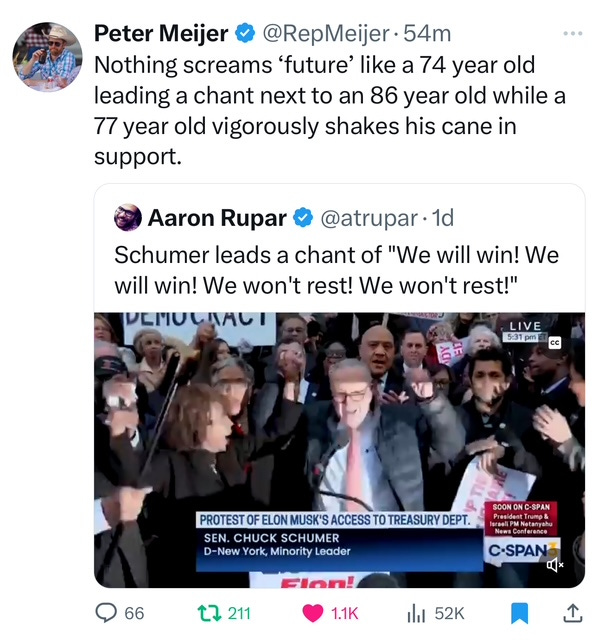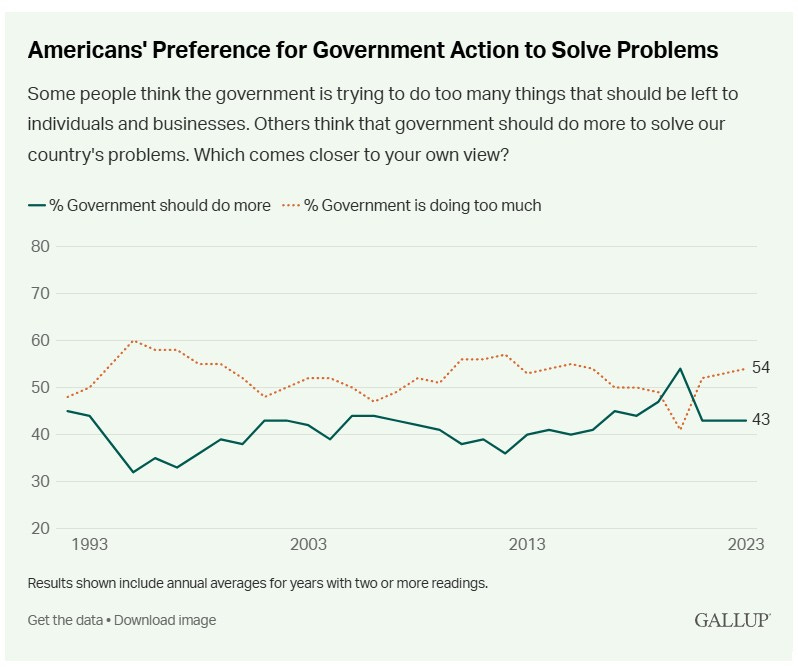Welcome to the Real World, Federal Employees
I'm sorry for your uncertainty. Welcome to reality. The Government is too big, fat, and out of control.
Like many of you, I benefit from working in the federal government for two of our three branches and the private sector, including for non-profits and nearly two decades for a Fortune 250 public corporation. I don’t know where paid political campaign work fits in over several election cycles, but it is feast and famine and rarely long-term. It’s not for the faint of heart.
It’s almost the exact opposite of how government employment works. Specifically, the career federal civil service, or those roughly 2.4 million workers that does not include the US Postal Service (600,000 and shrinking) and up to about a million contractors. I’m also not including the roughly 4,000 “at will” political appointments, from Cabinet secretaries to “confidential assistants.”
America elected more than a disruptor to the presidency this November. He brought change agents and outsiders, including the world’s wealthiest entrepreneur, probably “on the spectrum,” and scores of others, to reinvent the Executive Branch. When Trump signed the Executive Order creating the “Department of Government Efficiency” (DOGE) and made Elon Musk and others “special government employees,” you should have known it wouldn’t be just for show.
Perhaps you were hanging your hat on the reaction to President Ronald Reagan and his largely-forgotten “Grace Commission,” inspired by the same desire to repurpose the size and scope of the federal government. They had a little success, but most of their ideas from 40 years ago are still collecting dust next to the Ark of the Covenant in a government warehouse (an Indiana Jones: Raiders of the Lost Ark (1981) reference for those living in caves or under the age of 50).
President Reagan didn’t launch the President’s Private Sector Survey on Cost Control in the Federal Government (PPSSCC) until the second year of his presidency when he appointed chemical magnate J. Peter Grace to head it. It was supposed to last six months but was extended into 2004. Grace created 36 task forces and recruited over 150 business executives to make 2,500 recommendations by the end of Reagan’s first term. Some were implemented, but a Democratic-controlled Congress was not interested in cutting anything more than the Department of Defense. Even then.
Trump didn’t take a year, Elon Musk is no J. Peter Grace, and they ain’t waiting until the end of Trump’s term or even six months to get results.
It’s more like six days.
After the lack of success of the Grace Commission, budget reformers became innovative and aggressive. They started with the one agency that Congress would be willing to cut, given the collapse of the Soviet Union in 1989 and a strong public desire for a “peace dividend.” Base Closure and Realignment Commissions of the 1990s were established to consolidate and close military installations, making it more difficult for Members of Congress to protect local pork. It primarily forced Congress to take up-or-down votes on entire lists of installations. Talk about lost jobs.
It worked. Several commissions accomplished their missions, with some bases converting from federal to state National Guard bases (such as Alabama’s Fort Clellan and Virginia’s Fort Pickett-now-Barfoot). Others, including the former Willow Grove Naval Air Station in Philadelphia’s suburbs, were converted into regional airports and industrial parks.
Several of us have suggested that the nominally GOP Congress should do the same through the forthcoming Budget and Reconciliation process. This process allows it to expedite consideration without that pesky Senate filibuster getting in the way, so long as it focuses on spending and taxes (no policy-oriented legislation). Democrats used this to push Obamacare down our throats more than a decade ago, persuading the Senate’s parliamentarian to push the envelope on whether elements of the bill were “spending and taxes” or “policy.”
If you think DOGE is scary or effective now, wait until you give it BRAC-like powers.
But Musk and Team DOGE, now the targets of a left-wing cancel culture campaign, are wasting no time getting the Trump White House to agree. They focus on what they do without Congress, including reforms at the United States Agency of Aid and International Development, or USAID? They are hanging their legal hats on the very plain words at the being of Article II of the Constitution: “The executive Power shall be vested in a President of the United States of America.”

That’s not all, of course. One of Trump’s other first Executive Orders eliminated the so-called DEI (Division Diversity, Exclusion Equity, and Indoctrination Inclusion) programs that have grown and now populate not just every federal agency but plenty of private sector entities, at least until recently.
And the doxxing of DOGE employees is well underway. Cancel culture is alive and kicking, if not well. The Deep State, Swamp, or whatever you call it, is beginning to get off its back and swing back. Power and gravy trains are not easy to take away.
The usually nonpartisan Congressional Research Service of the Library of Congress rushed to outline how the Trump White House cannot treat USAID, which spends 0.7 percent of federal appropriations and was created by Executive Order, this way.
Wow. It seems like someone is over the target, as they say. The White House has cited a few examples of USAID funding programs, which only scratches the surface.
To be sure, USAID does some excellent work. I know of grant work to entities in African nations to help local farmers and entrepreneurs convert commodities to value-added processing, helping create jobs and grow incomes and other societal benefits. Together with the US Department of Agriculture, they are helping the sustainability of farming lands to increase yields. This is good, and I strongly suspect such grants will go forward once reviewed.
It is also true that we need a strong, well-run USAID to counter the growing influence of Communist Chinese “Belt and Road Initiative” investments and scams. Even Russia, despite its demographic and economic declines, is making inroads. Neither of these tyrannies is acting out of the goodness of their hearts. But using my tax dollars to pay for transgender surgeries in Guatemala doesn’t sound like an excellent investment to me.
You’re not seeing much reporting, but if you’re on Musk’s X, you must follow the @DOGE account. It details expenditures and contracts that have or will be terminated. Individually, they may seem like small potatoes, but every journey begins with a first step. These add up over time.
The politics of all this is fascinating and quite the sequel to previous efforts to cut and slash federal spending and programs. These programs and grants have constituencies and benefactors who will fight tooth and nail to protect them. They were created for a reason in the first place.
But what strikes me is the reaction of many federal employees to the changes. My social media feeds, from Nextdoor.com to Facebook and Instagram, are filled with stories of angst from furloughs. No one I’ve seen has actually been terminated yet. Still, the uncertainty and worse-case scenarios flow at hurricane levels, and the speculation, false claims, and reporting are almost laughable. The usual “people will die!” rhetoric is in full bloom.
To which I say, welcome to the real world.
Yes, I know the bargain most career civil servants think they operate under. In exchange for “accepting” federal employment and forgoing those “more lucrative” private sector opportunities - never mind that the average federal worker makes about $112,000 per year in the Washington, DC metroplex, not including benefits, compared to a national median income of about $61,440 per person (yes, I know about living and housing cost differences. How do you think it got that way?)- they have the “promise” of job security, free from political meddling, nice benefits, and a healthy pension and perhaps remaining in the Federal Employees Health Benefits program in retirement. The “spoils” system of government hiring for decades and centuries - to the victor goes the spoils - was a disaster, and the professionalization of the federal workforce was welcome.
I know there are “counter statistics” trumped by champions of federal employees, including federal employee labor unions, especially northern Virginia’s exclusively Democratic and progressive congressional delegation. A reported 140,000 federal employees are in the five north Virginia counties adjacent to Washington, DC.
I understand that many federal positions, from physicians with the Veterans Administration or Walter Reed Medical Center to researchers at the National Institutes of Health or Food and Drug Administration, require valuable expertise you must pay for for the talent and professionalism we all demand. I was happy to see that the salaries of the congressional staff increased a few years ago (Members of Congress haven’t raised their wages in decades).
But when truck drivers in Oklahoma or a practical nurse at a rural clinic in West Virginia, people who can’t do “remote work,” hear that only 12 percent of federal employees are occupying their offices, maybe you’ll understand, too.
And stories of their tax money being used to fund LGBT activism in foreign countries don’t compare well to busting households’ budgets due to higher prices for groceries and gas over the past four years, while government debt increased by about $6 trillion. We now spend $1 trillion per year to service our public debt. Forget paying it down.
Fellow Substacker and journalist Alex Berenson, the former New York Times journalist and author, published an email he received from one federal employee.
These paragraphs caught my eye.
I was an early Trump supporter - registered as a R in 2016 to vote for him in the primaries, attended a Trump rally. I did not vote for him in this election. I didn't vote for Harris either - I felt like I was choosing between lethal injection and hanging. I'd like an option other than death please.
I understand the triumph of the victory and did not expect nuance from the victors, but - as we often do - the pendulum has swung too far. The sense of glee and gotcha-ism is a problem.
Not every woman or minority hire was a mistake or incompetent. Not every federal worker is a grifter. Not every person without children leads a meaningless life. Prom culture isn't a good thing. A woman helicopter pilot shouldn't be vilified strictly because of her biological sex.
Her points are well taken, but I know a few million Americans who think the pendulum has swung too far in the other direction for too long and still has a ways to go. Thousands of people are suing the Federal Aviation Administration because they assert they were not hired because of their ethnicity despite sterling qualifications. Too often, merit has taken a back seat to DEI in hiring and retention. As she tacitly admits, there are grifters, incompetents, and worse in the federal government. No surprise there.
Expect more sob stories. With all due respect, welcome to the real world.
After being assured that I would not, I was laid off from work at the height of the recession, with a one-year-old at home and no other income. Every adult member of my immediate family has been involuntarily separated from at least one job. As a child, we hit hard times and tightened our belts when my father was laid off during the boom and bust cycles of Oklahoma’s oil-fueled economy in the 1960s and 70s. I remember my grandfather’s stories of surviving the Great Depression and the Dust Bowl days in Oklahoma, and he was forever grateful for his Works Progress Administration job, which involved building roads and bridges during the Roosevelt Administration.
You probably have some stories, too. Younger workers in the tech world today are no strangers to job terminations and layoffs in recent years. We’ve experienced that more than once in my family in recent years.
I’ve also sat in tense company meetings off and on over 16 years to hear how we would close a manufacturing plant, sell or terminate subsidiaries or product lines, and undergo a “reduction in force” to improve our profitability and bottom line. I was directed many times to cut spending in my paltry budget. This happens every day in the private sector. Despite our massive and growing federal debt, few government employees have experienced even the threat of that.
I don’t mean to sound insensitive. These words are easy for me to say as a retiree whose nest egg and pensions aren’t being threatened (until Social Security and Medicare become insolvent within a decade), except as they’re eaten by inflation and whipsawed by the whims of a financial market over which I have no control. But I’ve been there and done that, and so have many other people I know and love.
Facts also matter. At this writing, no agency has been “dismantled,” a few people have lost their jobs (some are being furloughed), and severe cuts in federal spending have yet to happen (a few contracts and DEI programs notwithstanding). Uncertainty is more than a way of life; it’s a promise. Congress and the judicial branch, working (hopefully) with the Trump Administration, will sort all this out. There are a lot of federal laws, from the Civil Service Reform Act and the Administrative Procedures Act, not to mention all laws creating programs and agencies that need resolving.
Article II notwithstanding, Congress has limited the Executive Branch's powers. Congress still has the power of the purse. The court challenges will continue for years, and eventually, all the facts will emerge, including how many actual offices and agencies were reduced or eliminated. Questions about whether the Trump Administration can transfer impounds or refuse to spend certain congressionally appropriated funds must also be sorted out.
Ultimately, the voters decide whom they send to Congress and the White House. Elections do matter. And the voters have spoken, just as they always do.
So, welcome to our world, federal employees. No one is blaming most of you for what you’re going through (unless you’re the agency director who agreed to send $2 million to Guatemala for transgender surgeries). It’s a consequence of poor decisions and election outcomes over many years, resulting in a long-overdue course correction for our country, just as when my former employer made tough decisions that allowed it to stay in business and serve the interests of its shareholders and investors when our overhead grew too much.
To paraphrase former Congressman John LeBoutillier (R-NY) from the early 1980s: the federal government is too big, fat, and out of control, and if all this results in both serious talk and efforts to trim wasteful and poorly-spent taxpayers’ dollars, we’re all winners in the long run.












Another great post, Kelly! As a long-time federal employee, now an A&AS contractor (to assure the next generation is prepared to take over what some have called “the keystone” of deterrence), I have seen pretty much everything referenced. While I can claim some small successes, I have been warned numerous times to leave certain things alone - often due to the “special interest” of a member of Congress, or a “big contributor” (usually to a Democrat or Democrat-favored interest). So, nothing you said was surprising or shocking. Hopefully the slash and burn will still allow some judicious assessment and cost/benefit analysis - especially for those short-term projects that have a definite near-term completion with mid-long term benefits.
Mahalo!
Great video about the usual "people will die" rhetoric⬇
https://youtu.be/eXWhbUUE4ko?si=Wt83lPkUYQjHnoBt